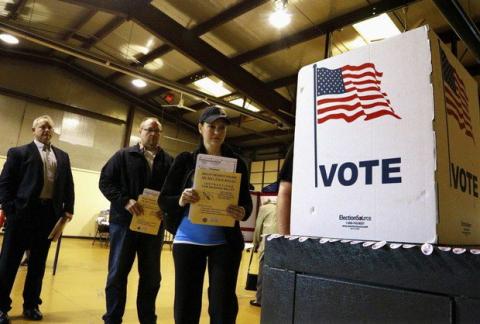If the recommendations of the Democratic National Committee’s (DNC) Unity Reform Commission (URC) are eventually approved and enacted, will the Democratic Party be “united”? Although fissures always exist within political parties, it appears that the Democratic Party’s coalition has not been this fragile since the Vietnam War. While the Vietnam War eventually ended, it is not clear whether the URC’s proposed reforms will be sufficient to appease Bernie Sanders supporters.
Even though the URC agreed to slash the number of superdelegates, they did not eliminate them entirely. Along with proposed reforms addressing accessibility to caucuses and more transparency of DNC finances, party officials will likely tout these measures as the compromises needed to bring Sanders supporters back into the fold.
However, Sanders’ supporters may view these proposals as mere window dressing -- a half-hearted attempt to assuage their concerns while maintaining the status quo. Additionally, the major shortcoming of the commission may have been its failure to call for open primaries across the board.
Open Primaries, the national organization dedicated to electoral reform, previously delivered over 50,000 petition signatures in support of open primaries to the leaders of the DNC and RNC. They then presented over 100,000 signatures to the URC, but a recommendation for open primaries in all 50 states did not make the cut.
As many Sanders supporters are independents, who experienced barriers to voting in the 2016 presidential primary, rebuffing calls for open primaries will not sit well with them. Furthermore, state Democratic parties continue to waffle on the subject of allowing independents to vote in partisan primaries.
While the URC was negotiating party fractures on the national level, my home state was electing a new chair for the Florida Democratic Party (FDP). The election was necessitated when the former chair was forced to resign in the face of allegations of sexual improprieties.
Four women announced their candidacies but, according to party rules, one was not eligible. I reached out to the three qualified candidates, asking each if they supported open primaries. Stacey Patel, did. Terrie Rizzo and Alma Gonzalez (as reported by Mitch Perry of “Florida Politics”), did not. As most expected, Terrie Rizzo was the eventual winner. While it appears that independents cannot look to the FDP for support, at least a line of communication has been established.
In addition to recently feeling out the new chair of the FDP, my organization has been engaged in a yearlong process of urging the Florida Constitution Revision Commission (CRC) to place an initiative for open primaries on the 2018 ballot.
Florida is unique, in that our state constitution requires the CRC be convened every twenty years. Its purpose is to review our state’s constitution and to recommend amendments. They have the power to place prospective amendments on the ballot and rely heavily on input from citizens. The CRC held nine public hearings and, in cooperation with Open Primaries, we turned out dozens of people to speak out in support of open primaries. Hundreds more submitted written statements of support, emailed individual commissioners, and over 9,000 have signed an online petition.
I have appeared twice before the Ethics and Elections Committee, the second time in support of a last-minute proposal filed by Commissioner William Schifino. Although our organization ultimately wants to see Florida adopt a top-two nonpartisan open primary, we support Commissioner Schifino’s proposal. While it keeps registered Democrats and Republicans in their respective lanes, it allows Florida’s 3.4 million nonaffiliated voters to choose a partisan ballot at the polls.
As more and more voters become educated about the importance of primaries (90% of contests are either uncontested or decided in primaries), the pressure on partisans to adopt open primaries will intensify.
In whichever state you reside, I implore you to seek out independent organizations actively working to reform our electoral process. If you live in Florida, and have not yet signed the petition, please consider it now. If you would like to become more involved, please contact me via our website.
